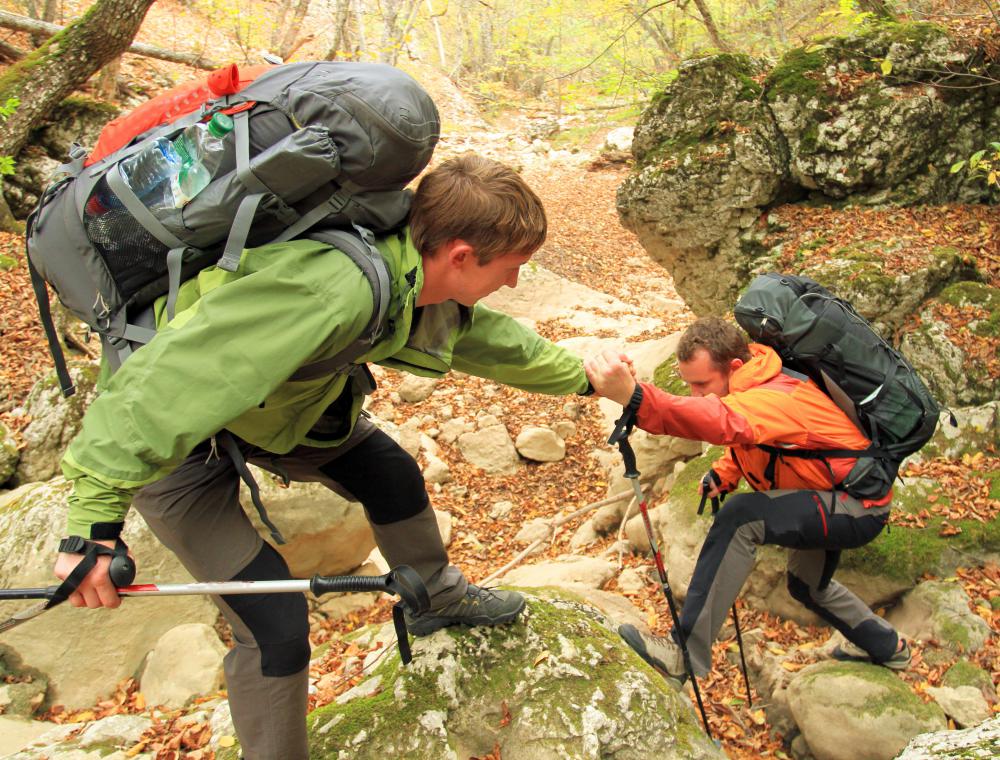At WiseGEEK, we're committed to delivering accurate, trustworthy information. Our expert-authored content is rigorously fact-checked and sourced from credible authorities. Discover how we uphold the highest standards in providing you with reliable knowledge.
What are the Different Types of Ecotourism Jobs?
Ecotourism is a segment of the tourist industry that focuses on using tourist effort to conserve natural resources and help native communities. This rapidly growing industry is popular with travelers who want to participate in conservation activities, rather than just enjoy the surroundings. There are many different jobs available in the ecotourism industry; with a chance to explore and introduce others to unexpected worlds of beauty and common goals for improvement and conservation, ecotourism jobs can be deeply rewarding for many people.
Many ecotourism jobs focus on the planning and arrangement of ecotours for travelers. Like traditional travel agents, an ecotourism coordinator helps develop an itinerary and schedule that suits the needs of a group of travelers. An ecotourism coordinator may offer several tours to different regions of the world that include airfare, lodging, and ecology-centric activities which benefit the native community or conservation efforts. In addition to needing qualifications of a regular travel agent, an ecotourism agent must have intimate knowledge of the region of each tour and be able to locate reputable companies for experiences, lodging, and work opportunities.

Naturalists, conservationists, and anthropologists may all find ecotourism jobs that suit their abilities. Part of the idea of an ecology-based tour is to provide education to tourists about local issues in the region of the tour. Scientists and conservationists that are working in the area can sometimes find jobs as lecturers or tour guides with ecotourist groups. Guides have a wonderful opportunity to expand the understanding of the public by providing tourists with unforgettable experiences that have a powerful message of conservation behind them.

Humanitarian organizations will often work with the ecotourism industry to increase their efforts in a region. Tourists on some trips can volunteer to work with a humanitarian group that is providing services in the area, such as by building homes or clean water supplies. This arrangement can be beneficial for all involved; while the humanitarian organization gets additional labor and a chance to spread awareness about important issues, tourists receive unforgettable opportunities for charity and volunteerism in an unusual setting. Ecotourism jobs in the humanitarian sector may include positions that train tourists in duties, oversee their activities, and provide educational and safety information.

Ecotourism jobs can also be found in the hotel industry. Many ecoutourists are concerned about issues of sustainability and resource conservation, and thus will want hotels that provide environmentally-conscious service. With attention to details such as local organic food, sustainably-sourced building materials, and an emphasis on recycling, nearly every hotel job from restaurant chef to front desk management can be tailored to fit an ecotourist aesthetic.
AS FEATURED ON:
AS FEATURED ON:
















Discussion Comments
MagicStrom — you actually have a good point. I believe people need jobs, but more importantly, people need good jobs (and a good education).
What you're saying is a little far fetched, but exciting, and if I were being optimistic, entirely possible. Imagine if you could educate a generation of native scientists to crawl through the jungles of Borneo! We might be able to cure every disease!
Orcadeal, you're right. I was an expat working on Kalimantan. And you're right, people need jobs. But we have to stop thinking that tourism is the only industry out there, or the best option for local people . . . or for poor people.
Imagine: instead of working as bartenders serving tourists beers, locals were trained to be park rangers and botanists. These are better jobs that help preserve awesome natural wonders.
As a former trekking guide, I can say that the best eco jobs are small scale.
Small scale tourism facilitates the coveted “S” word: Sustainability, and sustainable tourism jobs. Taking 10 clients 30 miles into the jungles of Boreno is certainly lower impact and more sustainable than building a town on the outskirts of that jungle.
The “Eco” in Ecotourism has become ubiquitous and deceiving. A developing town full of well intentioned ecotourists is still a threat to the wilderness.
So consider the 10 hikers. They’ll have a much deeper experience with the wilderness they’re traveling through, and their experience will make much less of an impact.
Maybe it’s time to change ecotourism to small scale or low impact tourism.
Post your comments